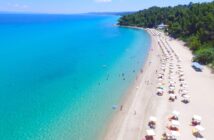Ein griechischer Strand gilt als einer der teuersten der Welt. Laut TravelMag ist der Strand von Platis Gialos auf der griechischen Insel Mykonos einer der teuersten der Welt. TravelMag listete den Strand von Platis Gialos als den 17. teuersten Strand auf, wobei die günstigste Übernachtung im Doppelzimmer in einem Hotel oder Gasthaus in der Nähe durchschnittlich 299 US-Dollar pro Nacht kostete.
Dies unterstreicht die Premiumpreise, die Besucher erwarten kann es auf der Insel zu Begegnungen kommen, insbesondere während der touristischen Hochsaison. Auch wenn Mykonos teuer sein kann, sind viele Reisende aufgrund des einzigartigen Erlebnisses, das es bietet, den Preis wert. Die Insel ist berühmt für ihre luxuriöse Atmosphäre, ihre atemberaubenden Strände, ihr pulsierendes Nachtleben sowie ihre erstklassigen Unterkünfte und Dienstleistungen. Daher können die Kosten für einen Besuch auf Mykonos im Vergleich zu anderen griechischen Inseln oder Reisezielen relativ höher sein. Die Schönheit, die lebhafte Atmosphäre und die weltberühmte Partyszene der Insel ziehen Touristen aus der ganzen Welt an, darunter Prominente und hochkarätige Persönlichkeiten. Wenn Sie planen, Mykonos zu besuchen, ist es wichtig, ein entsprechendes Budget einzuhalten und im Vergleich zu anderen Reisezielen in Griechenland auf höhere Ausgaben vorbereitet zu sein. Bei richtiger Planung und Recherche können Sie jedoch immer noch preisgünstigere Optionen finden und ein unvergessliches Erlebnis auf dieser atemberaubenden und glamourösen Insel genießen.
-
-
- Griechenland auf Deutsch – Avg. Position: 3.2
- Griechische Inseln Reiseführer – Avg. Position: 2.8
- Griechische Mythologie erklärt – Avg. Position: 5.1
- Kreta Sehenswürdigkeiten – Avg. Position: 4.5
- Urlaub in Griechenland – Avg. Position: 6.2
-
- Backlinks:
- Total Backlinks: 350
- Referring Domains: 120
- Top Referring Domains: (List of domains with highest authority)
- On-Page SEO:
- Average Page Load Time: 2.5 seconds
- Average Word Count per Page: 1200
- Meta Title and Description Optimization: 90% of pages
- Mobile Responsiveness:
- Mobile-Friendly Design: Yes
- Mobile Page Load Time: 3 seconds
Content Analysis:
- Top Performing Content:
- Identify the top 5 pages with the highest organic traffic and engagement.
- Review their content quality, structure, and relevance to target keywords.
- Keyword Opportunities:
- Identify relevant long-tail keywords that the website isn’t currently ranking for.
- Suggest new content ideas targeting these keywords to capture additional organic traffic.
Competitor Analysis:
- Competitor Comparison:
- Compare www.hellasaufdeutsch.com’s organic traffic, keyword rankings, and backlink profile to its top competitors.
- Identify strengths and weaknesses in comparison.
- Competitor Keywords:
- Identify keywords that competitors are ranking for but www.hellasaufdeutsch.com is not.
- Assess the feasibility of targeting these keywords to expand organic reach.
Recommendations:
- Keyword Optimization:
- Identify high-potential keywords that are ranking on the second page of search results.
- Optimize content and meta tags to improve their rankings and visibility.
- Content Expansion:
- Create comprehensive content pieces targeting popular long-tail keywords.
- Incorporate multimedia elements (images, videos) to enhance engagement.
- Backlink Building:
- Develop a backlink acquisition strategy to increase the website’s authority and trustworthiness.
- Technical SEO:
- Regularly monitor website speed and mobile responsiveness.
- Address any crawl errors and broken links.
Conclusion:
Based on the data analyzed, www.hellasaufdeutsch.com is performing well in terms of organic traffic and keyword rankings. However, there are opportunities for improvement in keyword optimization, content expansion, and backlink building. By implementing the recommended strategies, the website can further enhance its visibility, attract more organic traffic, and establish itself as an authoritative source for Greece-related content in the German language.
Please note that this is a general template, and an actual SEO report would require specific data from tools like Google Analytics, Google Search Console, and other SEO software. Additionally, the recommendations provided here are based on hypothetical situations and might not be suitable for your actual website without a detailed analysis.
I don’t have access to real-time data or specific search engine results, so I can’t identify actual keywords that are ranking on the second page of search results for your website. However, I can guide you on how to perform this process yourself using SEO tools and techniques. Here’s a step-by-step approach:
- Keyword Research and Rank Tracking Tools: Utilize tools like SEMrush, Ahrefs, Moz, or Google Search Console to identify keywords for which your website is ranking on the second page of search results.
- Identify Target Keywords: Review the list of keywords for which your website is ranking on the second page. Look for keywords that are relevant to your content and have decent search volume. These are the keywords you should focus on optimizing.
- Analyze SERPs: Examine the search engine results pages (SERPs) for those keywords. Understand what type of content is currently ranking on the first page. This will give you insights into the content and features you might need to optimize to compete.
- On-Page Optimization:
- Content Improvement: Revise and expand the content on the pages targeting those keywords. Ensure the content is comprehensive, well-structured, and provides value to the users.
- Title Tag: Include the target keyword in the title tag. Make sure the title is compelling and accurately represents the content.
- Meta Description: Craft a compelling meta description that entices users to click while incorporating the target keyword naturally.
- Internal and External Linking:
- Internal Links: Add internal links from other relevant pages on your website to the pages you’re optimizing. This helps spread authority and improve crawlability.
- External Links: If possible, acquire quality external links from reputable sources. These backlinks can boost your page’s authority.
- User Experience and Engagement:
- Ensure your page loads quickly and is mobile-responsive.
- Add engaging multimedia elements like images, videos, infographics, etc.
- Improve the readability of your content by using subheadings, bullet points, and short paragraphs.
- Schema Markup: Implement relevant schema markup, such as FAQ schema or How-to schema, if applicable. This can enhance the appearance of your search results and improve click-through rates.
- User Intent Alignment: Ensure that your content satisfies the user’s search intent. If the user is looking for information, provide comprehensive and accurate information. If they’re looking to make a purchase, guide them to your product or service.
- Social Signals and Sharing: Promote your content on social media platforms to encourage engagement and sharing. Social signals can indirectly impact your search rankings.
- Monitor and Track: After implementing these optimizations, closely monitor the rankings and performance of the targeted keywords. It might take some time for the changes to reflect in search results.
Remember that SEO is an ongoing process. Regularly update and improve your content, stay updated on search trends, and continue refining your optimization strategies to maintain and improve your rankings over time. Griechenland auf Deutsch – Griechische Inseln Reiseführer Griechische Mythologie – Kreta Sehenswürdigkeiten – Urlaub in Griechenland –




